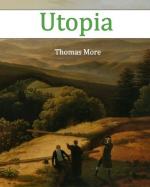|
This section contains 10,157 words (approx. 34 pages at 300 words per page) |

|
SOURCE: "Rhetoric as Poetic: Humanist Fiction in the Renaissance," in ELH, Vol. 43, No. 4, Winter, 1976, pp. 413-43.
In the excerpt below, Kinney argues the importance of rhetoric to educated Englishmen in the sixteenth century and examines its application in Thomas More's Utopia and George Gascoigne's The Adventures of Master F. J
"Immortal gods! said Catullus, what a variety of things, Crassus, you have embraced! what force, what abundance! and from what poverty have you dared to lead the orator forth and establish him in the kingdom of his fathers!" The author is Cicero, the work the conclusion of the De Oratore (III.xxxii.126); and the tribute follows Cicero's careful delineation of eloquence as dependent on clear distinctions, lucid ordering, sufficient amplitude, and a deliberate choice of matter and manner, the whole enabling the rhetoricians to weave from language something approaching the spell of poetry: in ipsa oratione quasi quemdam...
|
This section contains 10,157 words (approx. 34 pages at 300 words per page) |

|


